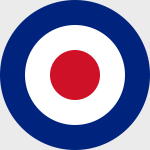Hobby Master HA7749 RAF North American Mustang Mk.IV Fighter - F/L Arthur S. "Joe" Doley, "Dooleybird", No.19 Squadron, RAF Peterhead, Scotland, 1945 (1:48 Scale)
"To defend ourselves, we had to attack."
- Major Ray Wetmore, November 27th, 1944
 The North American Aviation P-51 Mustang is an American long-range, single-seat fighter and fighter-bomber used during World War II and the Korean War, among other conflicts. The Mustang was designed in April 1940 by a team headed by James H. Kindelberger of North American Aviation (NAA) in response to a requirement of the British Purchasing Commission. The commission approached NAA to build Curtiss P-40 fighters and the newer P-46 under license for the Royal Air Force (RAF). Rather than build an old design from another company, NAA proposed the design and production of a more modern fighter. The prototype NA-73X airframe was rolled out on September 9th, 1940, 102 days after the contract was signed, and first flew on October 26th.
The North American Aviation P-51 Mustang is an American long-range, single-seat fighter and fighter-bomber used during World War II and the Korean War, among other conflicts. The Mustang was designed in April 1940 by a team headed by James H. Kindelberger of North American Aviation (NAA) in response to a requirement of the British Purchasing Commission. The commission approached NAA to build Curtiss P-40 fighters and the newer P-46 under license for the Royal Air Force (RAF). Rather than build an old design from another company, NAA proposed the design and production of a more modern fighter. The prototype NA-73X airframe was rolled out on September 9th, 1940, 102 days after the contract was signed, and first flew on October 26th.
The Mustang was designed to use the Allison V-1710 engine without an export-sensitive turbosupercharger or a multi-stage supercharger, resulting in limited high-altitude performance. The aircraft was first flown operationally and very successfully by the RAF and as a tactical-reconnaissance aircraft and fighter-bomber (Mustang Mk I). In mid 1942, Rolls Royce replaced the Allison with a Rolls-Royce Merlin 65, two-stage intercooled supercharged engine, resulting in a series of development aircraft known as the Mustang X. During testing at Hucknall, it quickly became clear that this dramatically improved the aircraft's performance at altitudes above 15,000 ft (4,600 m) (without sacrificing range). Following receipt of the test results and after further flights by a number of USAAF pilots, the results were so positive that North American began work on converting several aircraft and these were developed into the P-51B/C (Mustang Mk III) model, which became the first long range fighter to be able to compete with the Luftwaffe's fighters. The definitive version, the P-51D, was powered by the Packard V-1650-7, a license-built version of the two-speed, two-stage-supercharged Merlin 66, and was armed with six .50 caliber (12.7 mm) AN/M2 Browning machine guns.
Pictured here is a 1:48 scale replica of a RAF North American Mustang Mk.IV fighter that was piloted by Flight Leftenant Arthur S. "Joe" Doley and nicknamed "Dooleybird", which was attached to No.19 Squadron, then deployed to RAF Peterhead, Scotland, during 1945. Sold Out!
Dimensions:
Wingspan: 8-1/2-inches
Length: 7-1/2-inches
Release Date: April 2024
Historical Account: "Dooleybird" - No.19 Squadron was stationed at RAF Duxford after the outbreak of the Second World War in September 1939, and was part of No.12 Group, RAF Fighter Command. Douglas Bader was posted to the squadron in February 1940. In May and June 1940, the squadron helped provide air cover over the Dunkirk beaches. In June 1940, No. 19 Squadron began the receive Spitfire Mk.Ibs, which were armed with the Hispano cannon, however due to reliability issues the unit soon reverted to the Spitfire Mk.Ia. No.19 Squadron formed part of the Duxford Wing, No.12 Group's 'Big Wing' formation during the Battle of Britain.
Later versions of Spitfires were flown until the arrival of North American Mustang Mk.IIIs for close-support duties in early 1944. After D-Day, No. 19 Squadron briefly went across the English Channel before starting long-range escort duties from RAF Peterhead, Scotland, for Coastal Command off the coast of Norway. The Squadron converted to the Mustang Mk.IV in April 1945 while based at RAF Peterhead.


